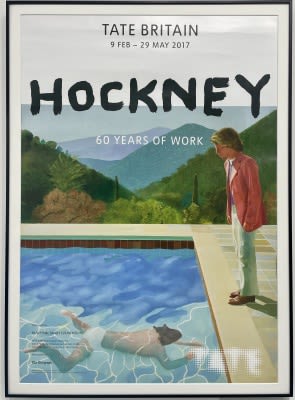This poster was created in 2017 for the retrospective at Tate Britain 'Hockney 60 Years of Work'. This poster details 'Portrait of and Artist (Pool with two Figures)'.
"Portrait of an Artist (Pool with Two Figures)" was created in 1972. The artwork is a large-scale composition that features two main subjects: a male swimmer submerged in a pool and a fully clothed man standing at the pool's edge, gazing towards the swimmer.
The painting showcases Hockney's distinctive style, characterized by vibrant colours, meticulous detail, and a blend of realism and abstraction. The use of bold, contrasting colours and precise brushwork contributes to the overall visual impact of the piece. The composition and juxtaposition of the two figures create a sense of tension and intrigue, inviting viewers to contemplate the relationship between them.
The swimmer in the pool is rendered with remarkable realism, capturing the play of light on the water and the physicality of the figure. The fully clothed man, Peter Schlesinger, is seen standing outside the pool, observing the swimmer with a contemplative gaze. The painting raises questions about the nature of their connection and the emotions evoked by their interaction.
"Portrait of an Artist (Pool with Two Figures)" has been interpreted in various ways, with themes of desire, isolation, and longing often explored. Some view the swimmer as a representation of youth and freedom, while others see the clothed figure as a symbol of longing or introspection. The tension between the two figures and the enigmatic narrative have contributed to the enduring fascination and interpretation of the artwork.
The painting has gained significant acclaim and is considered one of Hockney's most iconic works. It has been exhibited in major museums and galleries worldwide, and its profound impact on the art world is evident from its record-breaking sale price at auction in 2018 of over $90m.
"Portrait of an Artist (Pool with Two Figures)" continues to captivate audiences, showcasing Hockney's mastery in capturing the complexities of human relationships and emotions through his art.
Provenance
Tate Britain
